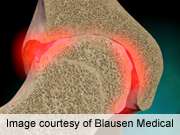(HealthDay)—Lithium reduces catabolic events in interleukin-1 β (IL-1β)-treated human articular chondrocytes and protects against cartilage degradation in IL-1β-treated mouse knee joints, according to a study published in the May issue of Arthritis & Rheumatology.
Takeshi Minashima, Ph.D., from New York University, and colleagues treated human articular chondrocytes with lithium chloride (LiCl) and IL-1β. Real-time polymerase chain reaction then determined expression levels of catabolic genes. Additionally, the activation of NF-KB was determined using luciferase reporter assays. Immunoblot analysis of total cell lysates determined the activities of MAPKs and the STAT-2 signaling pathway.
The researchers found that LiCl treatment resulted in decreased catabolic marker messenger RNA levels and activation of NF-KB, p38 MAPK, and STAT-3 signaling in IL-1β-treated articular chondrocytes. LiCl also directly inhibited IL-6-stimulated activation of STAT-3 signaling. Eight weeks after osteoarthritis induction surgery, the severity of cartilage destruction in LiCl-treated mouse knee joints or in LiCl-treated mouse femoral head explants after IL-1β treatment were markedly reduced versus in vehicle-treated joints or explants.
"LiCl reduced catabolic events in IL-1β-treated human articular chondrocytes and attenuated the severity of cartilage destruction in IL-1β-treated mouse femoral head explants and in the knee joints of mice with surgically induced OA," the authors write.
More information:
Abstract
Full Text (subscription or payment may be required)
Copyright © 2014 HealthDay. All rights reserved.























